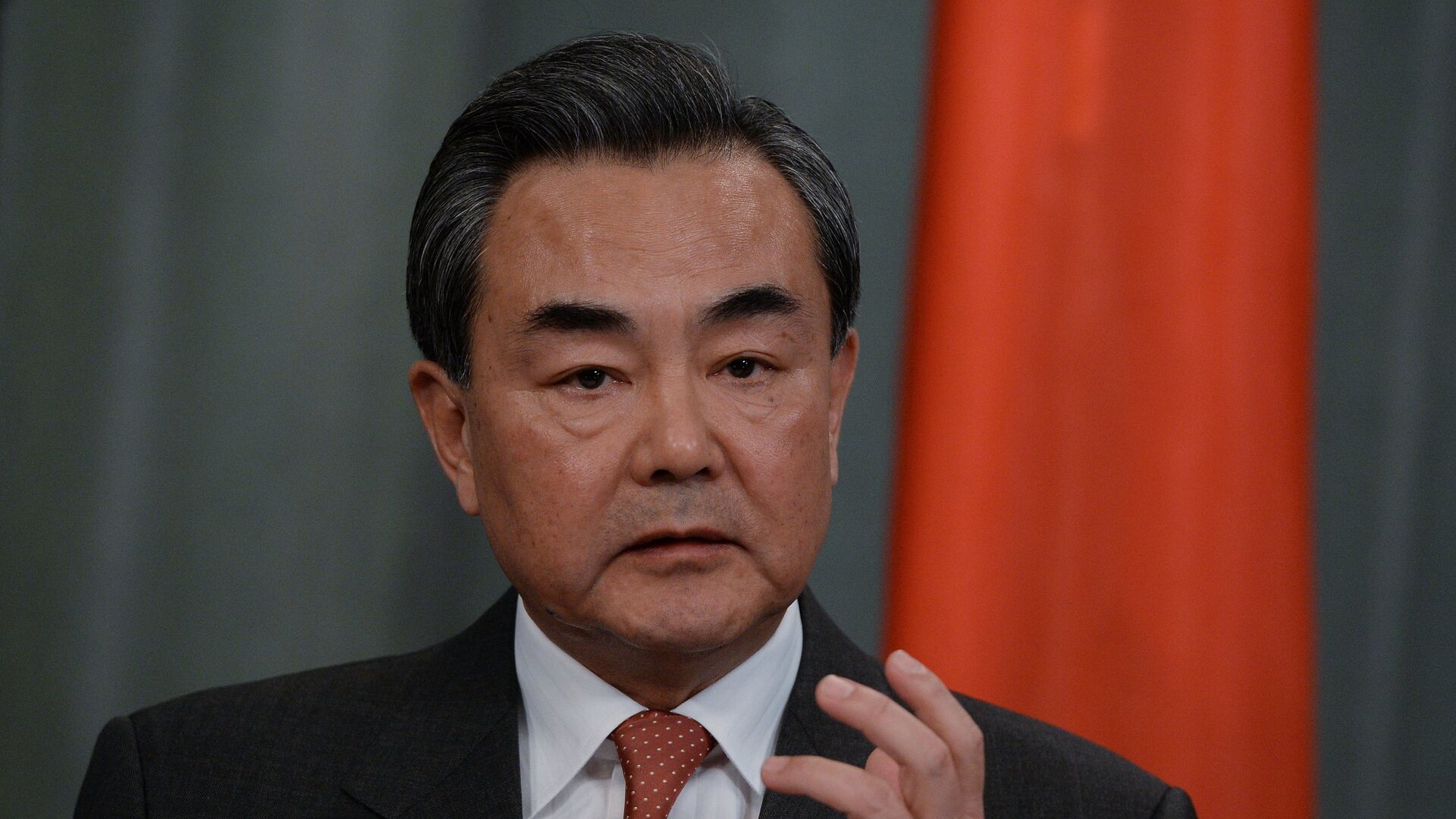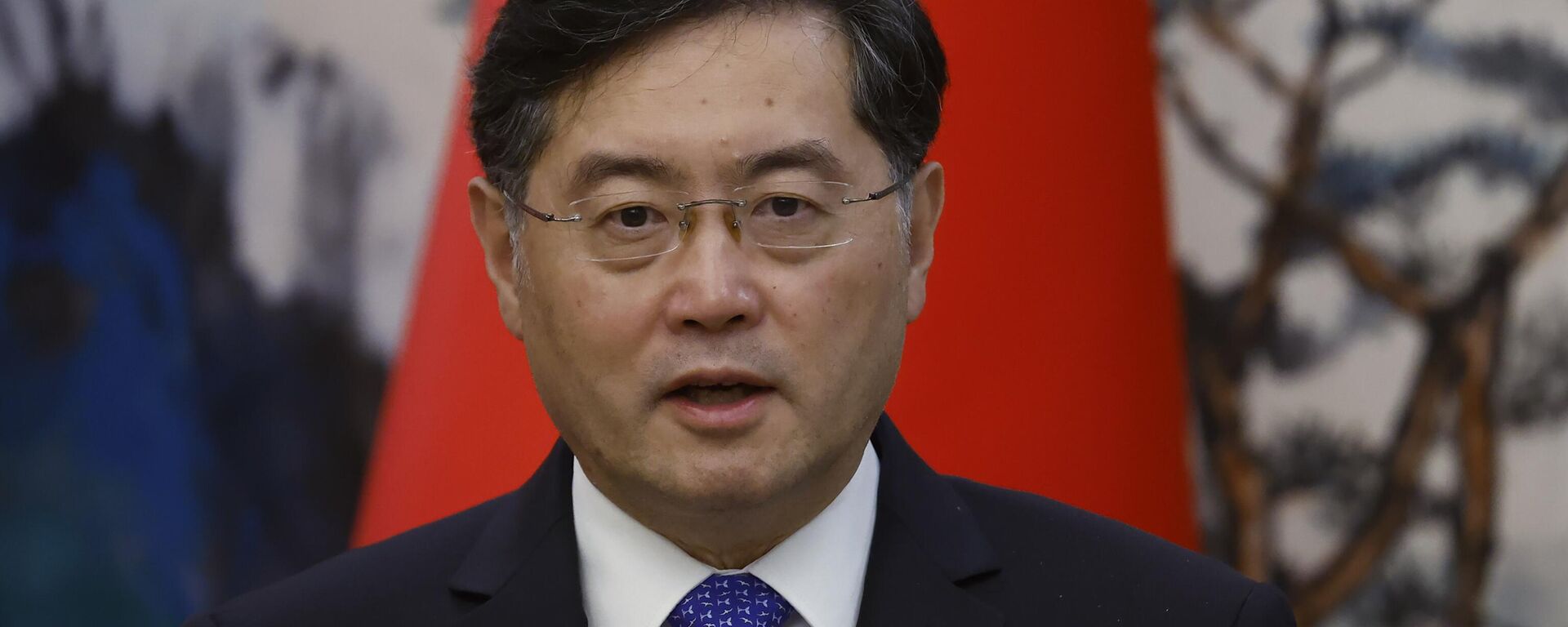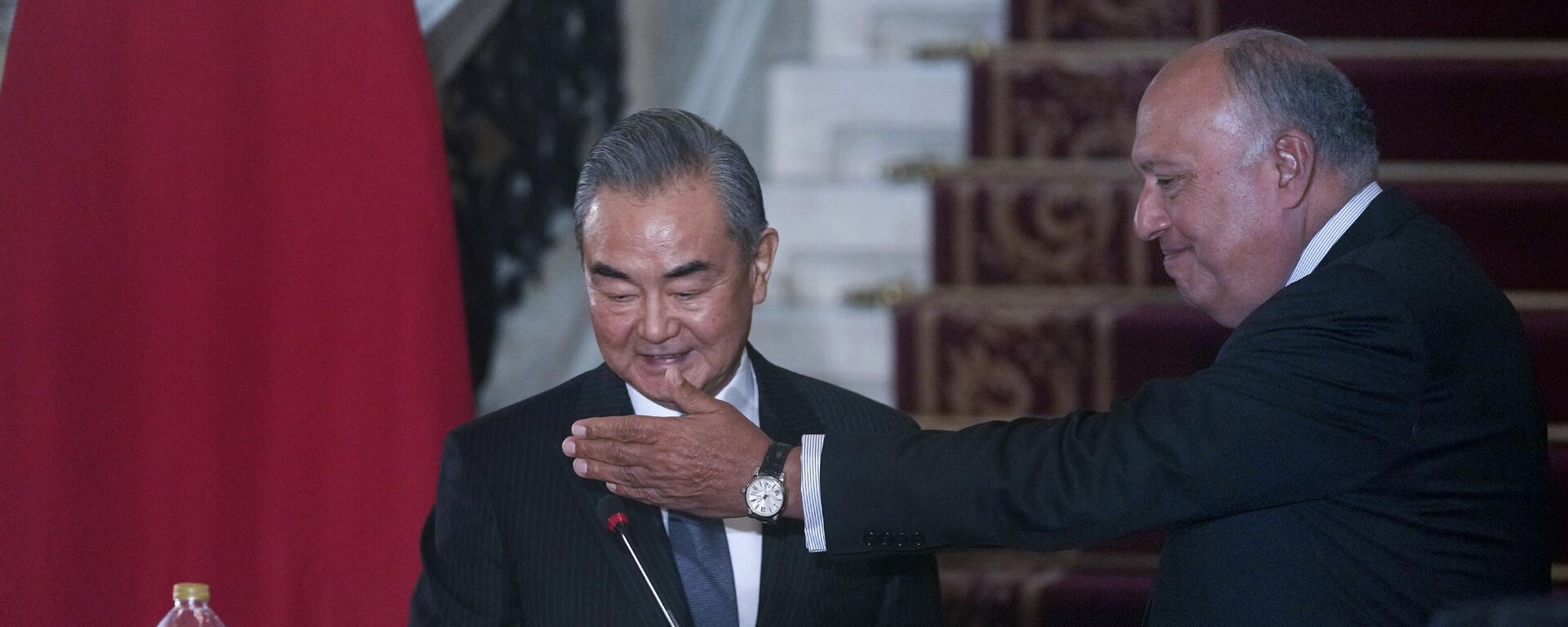https://en.sputniknews.africa/20240307/consequences-of-us-china-conflict-unimaginable-chinese-foreign-minister-says-1065427544.html
Consequences of US-China Conflict Unimaginable, Chinese Foreign Minister Says
Consequences of US-China Conflict Unimaginable, Chinese Foreign Minister Says
Sputnik Africa
BEIJING (Sputnik) - The second session of the 14th National People's Congress, China's top legislative body, kicked off in Beijing on Tuesday and will be held... 07.03.2024, Sputnik Africa
2024-03-07T10:05+0100
2024-03-07T10:05+0100
2024-03-07T10:05+0100
wang yi
china
united states (us)
beijing
international
asia
xi jinping
russia
taiwan
united nations security council (unsc)
https://cdn1.img.sputniknews.africa/img/101554/51/1015545103_0:0:2728:1535_1920x0_80_0_0_3a1770f1cf5eeca29b5987d9bb5c527c.jpg
Peaceful coexistence is a foundation of the US-China relationship, and the consequences of a conflict between the two major powers are unimaginable, Chinese Foreign Minister Wang Yi said on Thursday.Continuing the topic of China-US relations, Wang noted that the United States continues to perceive his country erroneously.The minister said that after the meeting of the two countries' leaders in San Francisco, “some progress was made in improving Chinese-American relations,” which, according to the diplomat, is fully consistent with the desires and interests of the two countries and world nations.He also highlighted that the promises made by the United States are not being fulfilled, while more and more diverse measures are being introduced to put pressure on China, and the list of unilateral sanctions continues to increase.However, despite all the challenges, Beijing is confident that the two countries can find the "right way" for coexistence, Wang said.Supporters of Taiwan's Independence Are Challenging China's SovereigntyThe Chinese top diplomat also raised the topic of Taiwan, saying that the one-China principle has become the consensus of the international community, and those who support the independence of Taiwan are challenging China's sovereignty.He added that "this fully demonstrates that the one-China principle has become the common consensus of the international community."Furthermore, Wang emphasized that Beijing's policy toward Taiwan is clear — that is, to seek peaceful reunification — and China will never allow the island to secede.He further said that China's "red lines" are also very clear, adding that "Taiwan will never be allowed to secede from the motherland."What Are The Steps to Resolve Israeli-Palestinian and Ukrainian conflicts? During the presser, Wang also elaborated on the settlement of two major conflicts: the escalation of the Israeli-Palestinian conflict and the Ukrainian crisis.Thus, talking about the Middle East, the politician said that China advocates for Palestine's full membership in the United Nations and calls on several UN Security Council members not to impede the process.China's top diplomat pointed to a long-lasting "occupation" of the Palestinian territories, saying that the global community should not ignore that fact.Turning to the topic of the conflict in Ukraine, Wang noted that Europe can create a sustainable security system if all parties to the Ukraine conflict abide by the United Nations Charter and take into account each other's concerns.Moreover, all Chinese efforts in the Ukraine conflict are aimed at paving the way to peace negotiations, the minister said, adding that China has always taken a fair stance on the Ukraine conflict and insisted on reconciliation.Thus, Beijing supports holding an international peace conference recognized both by Russia and Ukraine with the equal participation of all parties.New Impetus in Cooperation Between Russia and ChinaOne of the central topics of the press conference was the development of Russian-Chinese relations.The foreign minister said that China is ready to work with Russia to give new impetus to cooperation and continuously strengthen the foundation of friendship between the two peoples.Moreover, Russia and China have created a new model of relations between large counties that is completely different from the Cold War era.Thus, both nations are deepening cooperation, relying on the principles of non-confrontation.Therefore, political mutual trust between the states continues to deepen under the leadership of the two countries' heads.In addition to strengthening bilateral relations, Moscow and Beijing will continue strengthening international cooperation and maintaining global and regional security and stability, the minister said.Lastly, the foreign minister noted that natural gas from Russia is in thousands of Chinese homes, Chinese cars are driving along Russian streets, this fully reflects the stability and broad prospects for cooperation, Chinese Foreign Minister Wang Yi said Thursday.
https://en.sputniknews.africa/20230618/china-us-relations-at-lowest-point-since-their-establishment-chinese-foreign-minister-says-1060017422.html
https://en.sputniknews.africa/20240114/egyptian-chinese-foreign-ministers-call-for-ceasefire-in-gaza-release-of-hostages-prisoners-1064615931.html
china
united states (us)
beijing
asia
russia
taiwan
ukraine
Sputnik Africa
feedback@sputniknews.com
+74956456601
MIA „Rossiya Segodnya“
2024
Sputnik Africa
feedback@sputniknews.com
+74956456601
MIA „Rossiya Segodnya“
News
en_EN
Sputnik Africa
feedback@sputniknews.com
+74956456601
MIA „Rossiya Segodnya“
Sputnik Africa
feedback@sputniknews.com
+74956456601
MIA „Rossiya Segodnya“
wang yi, china, united states (us), beijing, international, asia, xi jinping, russia, taiwan, united nations security council (unsc), israeli-palestinian conflict, ukraine, ukraine crisis, cooperation, war, conflict, peace talks, gas, us sanctions
wang yi, china, united states (us), beijing, international, asia, xi jinping, russia, taiwan, united nations security council (unsc), israeli-palestinian conflict, ukraine, ukraine crisis, cooperation, war, conflict, peace talks, gas, us sanctions
Consequences of US-China Conflict Unimaginable, Chinese Foreign Minister Says
Longread
BEIJING (Sputnik) - The second session of the 14th National People's Congress, China's top legislative body, kicked off in Beijing on Tuesday and will be held throughout March 11. On its sidelines, Chinese Foreign Minister Wang Yi held an annual news conference where he covered a variety of topics.
Peaceful coexistence is a foundation of the US-China relationship, and the consequences of a conflict between the two major powers are unimaginable, Chinese Foreign Minister Wang Yi said on Thursday.
"Peaceful coexistence is the foundation. If two major countries like China and the United States clash, the consequences will be unimaginable," the minister said.
Continuing the topic of China-US relations, Wang noted that the
United States continues to perceive his country erroneously.
The minister said that after the meeting of the two countries' leaders in San Francisco, “some progress was made in improving Chinese-American relations,” which, according to the diplomat, is fully consistent with the desires and interests of the two countries and world nations.
"But we must note that the US's misperception of China remains," the official said.
He also highlighted that the promises made by the United States are not being fulfilled, while more and more diverse measures are being introduced to put pressure on China, and the list of unilateral
sanctions continues to increase.
“We urge the United States to recognize the general trend of historical development, to consider China’s development objectively and rationally...” Wang said, adding that if the United States focuses on suppressing China, it will definitely ultimately harm itself.
However, despite all the challenges, Beijing is confident that the two countries can find the "right way" for coexistence, Wang said.
"We believe that both sides can find the right way for two different major countries to coexist in this world," the minister stated.
Supporters of Taiwan's Independence Are Challenging China's Sovereignty
The Chinese top diplomat also raised the topic of
Taiwan, saying that the one-China principle has become the consensus of the international community, and those who support the independence of Taiwan are challenging China's sovereignty.
"After Taiwan's election, we have seen more than 180 countries and international organizations reaffirm their commitment to the one-China principle and the support for China in defending state sovereignty and territorial integrity," Wang said.
He added that "this fully demonstrates that the one-China principle has become the common consensus of the international community."
"If there are people who condone and support the independence of Taiwan, they are challenging China's sovereignty, and if some countries insist on maintaining official relations with Taiwan, they are interfering in the internal affairs of China," the minister said.
Furthermore, Wang emphasized that Beijing's policy toward Taiwan is clear — that is, to seek peaceful reunification — and China will never allow the island to secede.
"Our policy toward ... [Taiwan] is clear: we will continue to pursue peaceful reunification with utmost sincerity," the diplomat stated.
He further said that China's "red lines" are also very clear, adding that "Taiwan will never be allowed to secede from the motherland."
What Are The Steps to Resolve Israeli-Palestinian and Ukrainian conflicts?
During the presser, Wang also elaborated on the settlement of two major conflicts: the escalation of the
Israeli-Palestinian conflict and the Ukrainian crisis.
Thus, talking about the Middle East, the politician said that China advocates for Palestine's full membership in the United Nations and calls on several
UN Security Council members not to impede the process.
"China firmly supports the Palestinian people's just calls of regaining their legitimate rights and is always committed to a comprehensive, just and lasting solution to the question of Palestine at an early date. We support Palestine's full membership in the UN and urge certain UN security members not to lay obstacles," Wang said.
China's top diplomat pointed to a long-lasting "occupation" of the Palestinian territories, saying that the global community should not ignore that fact.
Turning to the topic of the
conflict in Ukraine, Wang noted that Europe can create a sustainable security system if all parties to the Ukraine conflict abide by the United Nations Charter and take into account each other's concerns.
"I believe that Europe can build a truly balanced, effective and sustainable security system if each party abides by the goals and principles of the UN Charter, and the reasonable concerns of all sides [of the Ukraine conflict] are properly addressed," the minister pondered.
Moreover, all
Chinese efforts in the Ukraine conflict are aimed at paving the way to peace negotiations, the minister said, adding that China has always taken a fair stance on the Ukraine conflict and insisted on reconciliation.
"Everything we do is aimed at achieving one goal — paving the way for ending the war and starting peace talks," Wang told the news conference.
Thus, Beijing supports holding an international peace conference recognized both by Russia and Ukraine with the equal participation of all parties.
"China supports convening in a timely manner an international peace conference recognized by both Russia and Ukraine with equal participation of all parties and impartial discussion of all peace plans," the minister noted.
New Impetus in Cooperation Between Russia and China
One of the central topics of the press conference was the development of Russian-Chinese relations.
The foreign minister said that China is ready to work with Russia to give new impetus to
cooperation and continuously strengthen the foundation of friendship between the two peoples.
"This year marks the 75th anniversary of the establishment of diplomatic relations [between Russia and China]; we will jointly organize and hold the China-Russia year of culture; relations of two countries are opening up new opportunities for development," Wang stated.
Moreover, Russia and China have created a new model of relations between large counties that is completely different from the
Cold War era.
"China and Russia, as major world powers and permanent members of the UN Security Council, have created a new model of relations between major states, which is completely different from the old Cold War times," Wang underlined.
Thus, both nations are deepening cooperation, relying on the principles of non-confrontation.
"[Russia and China] firmly adhere to good-neighborliness, are deepening comprehensive strategic cooperation, relying on the principles of non-alignment, non-confrontation and nondirectedness against third parties," Wang said.
Therefore, political mutual trust between the states continues to deepen under the leadership of the two countries' heads.
"Under the strategic leadership of President Xi Jinping and President [Vladimir] Putin, China's comprehensive strategic cooperation in the new era has maintained a high level of functioning... Political mutual trust between the countries continues to deepen," the diplomat noted.
In addition to strengthening bilateral relations, Moscow and Beijing will continue strengthening international cooperation and
maintaining global and regional security and stability, the minister said.
"Our two sides will strengthen international multilateral cooperation, implement genuine multilateralism, safeguard the system of international relations with the central role of the United Nations, and maintain regional and global security and stability," Wang stated.
Lastly, the foreign minister noted that natural
gas from Russia is in thousands of Chinese homes, Chinese cars are driving along Russian streets, this fully reflects the stability and broad prospects for cooperation, Chinese Foreign Minister Wang Yi said Thursday.
"Last year, bilateral trade reached a record level of $240 billion, reaching the set target of $200 billion ahead of schedule... Russian natural gas is being supplied to thousands of households in China, and Chinese cars are driving on Russian streets: this fully reflects the strong sustainability and broad prospects for mutually beneficial cooperation between the two countries," Wang concluded.



